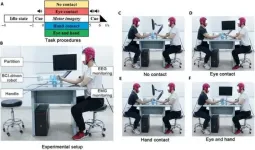(Press-News.org) BOSTON—People of color and those who experience social vulnerability are more likely to experience worse glycemic control than their white counterparts, according to research presented Sunday at ENDO 2024, the Endocrine Society’s annual meeting in Boston, Mass.
“As of 2021, 29.7 million people were living with diabetes, contributing to significant morbidity across the population. Despite advances in diabetic care, marginalized populations bear an increased burden of diabetic complications,” said study author Jennifer Tich, M.D., from Internal Medicine-Pediatrics R3 at the University of Rochester in Rochester, N.Y.
Tich and colleagues identified about 26,000 people living with diabetes. They used census data to calculate their social vulnerability index (SVI) based on 16 variables in four themes: socioeconomic status, household characteristics, racial/ethnic minority status, and housing/transportation.
The scoring range for individual SVI is ranked 0 (lowest) to 1 (highest vulnerability). They also accounted for self-reported race and ethnicity, food and housing insecurity, transportation and social isolation.
“We found that both race and social vulnerability were independently associated with diabetes control. Increasing social vulnerability was associated with worsening glycemic control across all racial groups studied,” said the study’s Principal Investigator and University of Rochester Professor, Robert Fortuna, M.D., M.P.H. “Within a given social vulnerability category, non-white participants had worse diabetic control than white participants.”
Specifically, the data revealed 73.6% of patients had controlled HbA1C (white: 75.7%, Black: 66.1%, Asian: 75.2%, and other races: 67.3%). However, when controlling for race, social vulnerability led to worse control.
Around half of the patients were additionally surveyed on social determinants of health. Those who reported food insecurity showed lower rates of glycemic control (67.7%) compared with those without food insecurity (79.8%). Patients who reported housing insecurity fared similarly, with 66.0% having lower control compared with their counterparts who had better housing security (80.1%). People with no unmet transportation needs had better glycemic control (79.2%) than those who had unmet transportation needs (67.7%).
“These findings highlight the importance of social vulnerability and social determinants of health on the control of diabetes. These findings further depict the persistent racial disparities across the spectrum of social vulnerability,” Tich said.
# # #
Endocrinologists are at the core of solving the most pressing health problems of our time, from diabetes and obesity to infertility, bone health, and hormone-related cancers. The Endocrine Society is the world’s oldest and largest organization of scientists devoted to hormone research and physicians who care for people with hormone-related conditions.
The Society has more than 18,000 members, including scientists, physicians, educators, nurses and students in 122 countries. To learn more about the Society and the field of endocrinology, visit our site at www.endocrine.org. Follow us on Twitter at @TheEndoSociety and @EndoMedia.
END
Race and social vulnerability impact glycemic control in people with diabetes
2024-06-01
ELSE PRESS RELEASES FROM THIS DATE:
Higher blood concentrations of testosterone are associated with reduced risk of developing type 2 diabetes in men under 65
2024-06-01
BOSTON—Testosterone appears protective against developing type 2 diabetes in men who are overweight or obese and under age 65, but not in men over that age, according to a study presented Saturday at ENDO 2024, the Endocrine Society’s annual meeting in Boston, Mass.
“A low blood testosterone concentration is an independent risk factor for developing type 2 diabetes, and high levels of testosterone appear protective against the development of type 2 diabetes,” said lead researcher ...
Lowering fecal immunochemical test positivity threshold vs multitarget stool RNA testing for colorectal cancer screening
2024-06-01
About The Study: This study found that comparable levels of sensitivity and specificity as reported for the multitarget stool RNA (mt-sRNA) test in the colorectal cancer (CRC)-PREVENT study could be achieved by lowering the fecal immunochemical test positivity threshold, without additional mt-sRNA testing. The findings are similar to previous observations for multitarget stool DNA testing.
Corresponding Author: To contact the corresponding author, Hermann Brenner, M.D., M.P.H., email h.brenner@dkfz.de.
To access the embargoed study: Visit our For The Media website ...
Revolutionary brain-to-brain technology boosts brain-computer interface performance
2024-06-01
A groundbreaking study from Tsinghua University in collaboration with Imperial College London has unveiled a novel technique that significantly enhances brain-computer interface (BCI) systems by integrating brain-to-brain interactions among users. This innovative approach, detailed in a new study published in the journal Cyborg Bionic Systems, demonstrates the potential for improved BCI performance in applications such as rehabilitation and multitasking devices.
The research, led by Dr. Tianyu Jia and a team of interdisciplinary scientists, explored the effects of social interactions, ...
Insurance often denies GLP-1 medications for teens with type 2 diabetes, obesity
2024-06-01
BOSTON—Health insurance companies often deny coverage for new medications that treat children and teens with obesity and type 2 diabetes, meaning many patients who need treatment are unable to afford it, according to a study presented at ENDO 2024, the Endocrine Society’s annual meeting in Boston, Mass.
The medications, called GLP-1 receptor agonists (GLP1Ra), are often denied despite being approved by the U.S. Food and Drug Administration, especially if children do not have type 2 diabetes, the researchers found.
GLP1Ra drugs include liraglutide (Victoza, Saxenda). The researchers ...
Childhood stress linked with earlier substance use in male and female teens
2024-06-01
BOSTON—Stress during childhood is associated with earlier substance use in male and female adolescents, according to a study presented Saturday at ENDO 2024, the Endocrine Society’s annual meeting in Boston, Mass. Traumatic events may increase substance use risk for males, while environmental stress and early puberty may increase the risk for females, the researchers found.
Early life stress is children’s experiences of abuse, neglect and conflict. Approximately 20% of adolescents in the United States have experienced early life stress at some point, and these experiences ...
Childhood sedentariness may cause premature liver damage in young adulthood
2024-06-01
BOSTON—Children who are sedentary for more than six waking hours a day have a significantly increased risk of severe fatty liver disease and liver cirrhosis by young adulthood, a new study finds. The research findings will be presented Saturday at ENDO 2024, the Endocrine Society’s annual meeting in Boston, Mass and published in Nature’s npj Gut and Liver.
“We found that this relationship between sedentariness and liver damage is likely causal,” said lead researcher Prof. Andrew Agbaje, M.D., M.P.H., Ph.D., of the University of Eastern Finland ...
Experimental therapy shows promise in pancreatic cancer clinical trial
2024-06-01
WASHINGTON --- Clinicians at Georgetown University’s Lombardi Comprehensive Cancer Center reported promising preliminary findings based on outcomes in the first six patients with metastatic pancreatic cancer enrolled in a phase 2 clinical trial of the experimental drug BXCL701 in combination with the immunotherapy drug pembrolizumab (Keytruda). Immunotherapy drugs alone have not shown to be responsive to pancreatic cancer.
The findings were presented at the American Society of Clinical Oncology 2024 annual meeting in Chicago on June 1, 2024 (LBA4132).
BXCL701, made by BioXcel Therapeutics, is ...
Clinical trials show promise in treating central nervous system lymphoma, breast cancer, and glioblastoma
2024-06-01
Boston – Dana-Farber Cancer Institute researchers are leading 3 separate studies with encouraging results in treating patients with central nervous system (CNS) lymphoma, breast cancer, and glioblastoma. The studies support future research in these potential breakthroughs where treatment options may be limited. The research teams will present their findings at the 2024 Annual Meeting of the American Society of Clinical Oncology (ASCO) in Chicago, May 31-June 4, 2024. ASCO is the world’s largest clinical cancer research meeting, attracting more than 30,000 global oncology professionals.
These findings are among more than 80 studies presented at ASCO that ...
Crisis intervention program leverages social media to reduce suicide risk
2024-06-01
An Oregon-based program that monitors social media use may have helped deter more than 150 youth suicide attempts in the five years it’s operated, reports a new study published online today in the journal Psychiatric Services.
Staff with Lines for Life, a nonprofit that operates mental health crisis support services, and researchers at Oregon Health & Science University collaborated to closely document interventions by the Safe Social Spaces program, launched in 2019 by Lines for Life.
The study’s senior author said it’s an example of meeting people where they are.
“Community engagement is critical,” said Alan Teo, M.D., M.S., associate professor of ...
An unlikely hero in evolution: worms
2024-06-01
One of Earth’s most consequential bursts of biodiversity—a 30-million-year period of explosive evolutionary changes spawning innumerable new species—may have the most modest of creatures to thank for the vital stage in life’s history: worms.
The digging and burrowing of prehistoric worms and other invertebrates along ocean bottoms sparked a chain of events that released oxygen into the ocean and atmosphere and helped kick-start what is known as the Great Ordovician Biodiversification Event, roughly 480 million years ago, according ...

